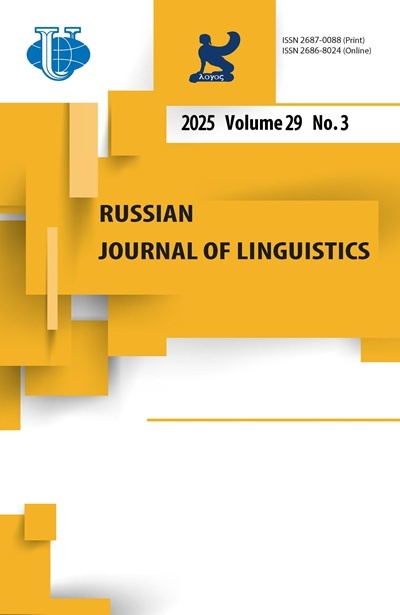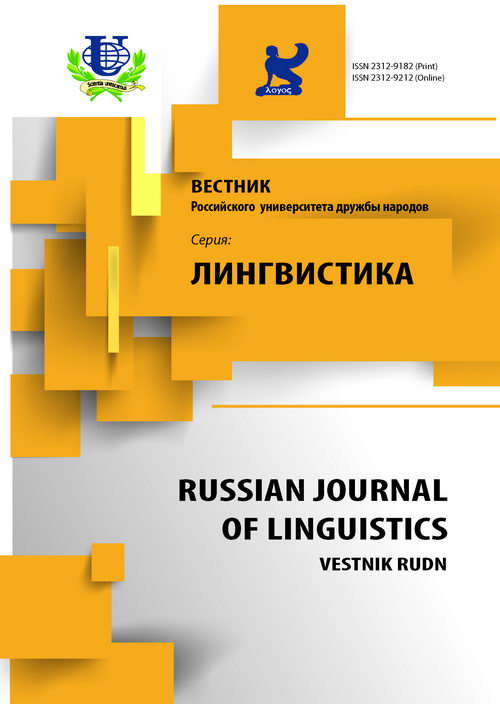Выбор языка англо-арабскими жителями Лондона при выражении гнева
- Авторы: Деваеле Ж.1, Каддоурах И.2
-
Учреждения:
- Лондонский университет
- Сент-Эндрюсский университет
- Выпуск: Том 19, № 4 (2015)
- Страницы: 82-100
- Раздел: Статьи
- URL: https://journals.rudn.ru/linguistics/article/view/9260
- ID: 9260
Цитировать
Полный текст
Аннотация
Цель данного проекта состоит в частичном воспроизведении исследования Деваеле (2013), выделившего факторы, оказывающие влияние на выбор языка для выражения гнева информантами-мультилингвами из разных стран мира. Наша задача состояла в том, чтобы определить, аналогично ли влияние факторов, обнаруженных в большой и чрезвычайно гетерогенной группе, на выбор первого (Я-1) или второго языка (Я-2) в относительно гомогенной лингвокультурной группе. В качестве испытуемых были отобраны 110 англоязычных арабов, проживающих в Лондоне. Проведенный количественный и качественный анализ полученных данных показал, что, как и в исследовании Деваеле (2013), для выражения гнева, направленного на себя, членов семьи, друзей и незнакомых, испытуемые предпочитали арабский язык (Я-1). Однако для выражения гнева в письменной форме, а иногда и в случае разногласий с арабоязычными собеседниками предпочтение отдавалось английскому языку (Садчев, Гайл и Пауэлз 2013). Частотность использования английского языка для выражения гнева связана с возрастом, в котором его начинали изучать, контекстом изучения (естественным или комбинированным), частотой его использования для коммуникации, степенью социализации в англоязычном социуме, а также восприятием английского как языка, подходящего/неподходящего для выражения эмоций. Помимо этого, как показало проведенное исследование, на выбор языка оказывают влияние пол, возраст и уровень образования. Участники исследования пояснили также, какое влияние на выбор языка для выражения гнева оказывают их религиозные верования, культура и идеологическая позиция.
Ключевые слова
Об авторах
Жан-Марк Деваеле
Лондонский университет
Email: j.dewaele@bbk.ac.uk
Биркбек Колледж
Исраа Каддоурах
Сент-Эндрюсский университет
Email: israaqaddourah@gmail.com
Список литературы
- Boiger, M., & Mesquita, B. (2012). The construction of emotion in interactions, relationships, and cultures. Emotion Review, 4, 221-229.
- Bond, M.H., & Lai, T.M. (1986). Embarrassment and code-switching into a second language. The Journal of Social Psychology,126, 179-189.
- De Leersnyder, J., Mesquita, B., & Kim, H. (2011). Where do my emotions belong? A study on immigrants' emotional acculturation. Personality & Social Psychology Bulletin, 37, 451-463.
- Dewaele, J.-M. (2004a). The emotional force of swearwords and taboo words in the speech of multilinguals. Journal of Multilingual and Multicultural Development, 25(2/3), 204-222.
- Dewaele, J.-M. (2004b). Blistering barnacles! What language do multilinguals swear in?! Estudios de Sociolinguïstica, 5(1), 83-105.
- Dewaele, J.-M. (2006). Expressing anger in multiple languages. In A. Pavlenko (Ed.), Bilingual minds: Emotional Experience, Expression, and Representation (pp. 118-151). Clevedon: Multilingual Matters.
- Dewaele, J.M. (2008). The emotional weight of ‘I love you’ in multilinguals’ languages. Journal of Pragmatics, 40(10), 1753-1780.
- Dewaele, J.-M. (2010). Christ fucking shit merde! Language preferences for swearing among maximally proficient multilinguals. Sociolinguistic Studies, 4(3), 595-614.
- Dewaele, J.-M. (2011). The differences in self-reported use and perception of the L1 and L2 of maximally proficient bi- and multilinguals: A quantitative and qualitative investigation. International Journal of the Sociology of Language,208, 25-51.
- Dewaele, J.-M. (2013). Emotions in Multiple Languages. Basingstoke: Palgrave Macmillan, 2nd ed.
- Dewaele, J.-M., & Costa, B. (2013). Multilingual clients’ experience of psychotherapy. Language and Psychoanalysis,2(2), 31-50.
- Dewaele, J.-M., & Li Wei (2014a). Intra- and inter-individual variation in self-reported code-switching patterns of adult multilinguals. International Journal of Multilingualism, 11, 225-246.
- Dewaele, J.-M., & Li Wei (2014b). Attitudes towards code-switching among adult mono- and multilingual language users. Journal of Multilingual and Multicultural Development, 35, 235-251.
- Dewaele, J.-M., & Pavlenko, A. (2001-2003). Webquestionnaire Bilingualism and Emotions. University of London.
- Dewaele & Zeckel, I. (to appear). The psychological and linguistic profiles of self-reported code-switchers. International Journal of Bilingualism. doi: 10.1177/1367006915575411
- Dörnyei, Z., & Taguchi, T. (2009). Questionnaires in Second Language Research: Construction, Administration. London: Routledge.
- Ethnicity and National Identity in England and Wales (2011). Office for National Statistics. http://www.ons.gov.uk/ons/rel/census/2011-census/key-statistics-for-local-authorities-in-england-and-wales/rpt-ethnicity.html. Accessed 20/01/2014.
- Güngör, D., Bornstein, M.H., De Leersnyder, J., Cote, L., Ceulemans, E., & Mesquita, B. (2013). Acculturation of personality: A three-culture study of Japanese, Japanese Americans, and European Americans. Journal of Cross-Cultural Psychology, 44(5), 701-718.
- Li, Wei (2007). Dimensions of bilingualism. In Li Wei (Ed.), The Bilingualism Reader (pp. 3-22). London: Routledge, 2nd ed.
- Markus, H., & Kitayama, S. (1991). Culture and self: Implication for cognition, emotion, and motivation. Psychological Review, 98, 224-253.
- Mesquita, B. (2010). Emoting. A contextualized process. In B. Mesquita, L.F. Barrett & E. Smith (Eds.), The mind in context (pp. 83-104). New York: Guilford.
- Miladi, N. (2006). Satellite TV News and the Arab Diaspora in Britain: Comparing Al-Jazeera, the BBC and CNN. Journal of Ethnic and Migration Studies, 32(6), 947-960.
- Othman, M.F.A. (2006). Language Choice among Arabic-English Bilinguals in Manchester, Britain. Unpublished MAdissertation (University of Manchester). Available at: http://languagecontact. humanities.manchester.ac. uk (Last accessed: 9 November, 2013).
- Pavlenko, A. (2004). “Stop doing that, ia komu skazala!”: Language choice and emotions in parent-child communication. Journal of Multilingual and Multicultural Development, 25(2/3), 179-203.
- Pavlenko, A. (2005). Emotions and Multilingualism. Cambridge: Cambridge University Press.
- Pavlenko, A. (2012). Affective processing in bilingual speakers: Disembodied cognition? International Journal of Psychology, 47, 405-428.
- Porte, G. (2012). (ed.) Replication Research in Applied Linguistics. Cambridge: Cambridge University Press.
- Ritchie, W.C., & Bhatia, T.K. (2013). Social and psychological factors in language mixing. In T.K. Bhatia & W.C. Ritchie (Eds.), The Handbook of Bilingualism (pp. 375-390). Chichester, UK: John Wiley & Sons.
- Sachdev, I., Giles, H., & Pauwels, A. (2013). Accommodating multilinguality. In T.K. Bhatia & W.C. Ritchie (Eds.), The Handbook of Bilingualism (pp. 391-416). Chichester, UK: John Wiley & Sons.
- Van Lancker, D., & Cummings, J.L. (1999). Expletives: Neurolinguistic and neurobehavioral perspectives on swearing. Brain Research Reviews,31, 83-104.
- Wierzbicka, A., & Harkins, J. (2001). Introduction. In J. Harkins & A. Wierzbicka (Eds.) Emotions in crosslinguistic perspective (pp. 1-34). Berlin: Mouton De Gruyter.
Дополнительные файлы















